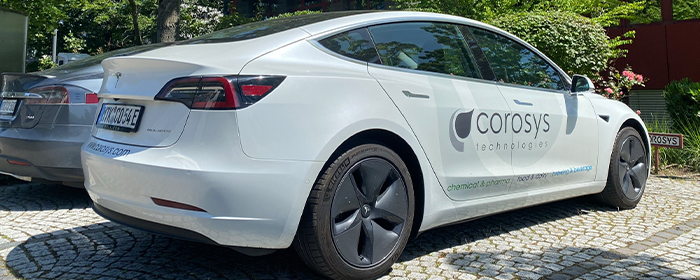The beginning of a new era for the recently reorganized group of companies surrounding corosys technologies GmbH also means the end of an old one: that of the combustion engine. This means that no vehicles based on combustion engines will be purchased in the future, but that investments will be made exclusively in e-mobility – all new cars in the pool will be fully electric and, to a very small extent, plug-in hybrids.
This change already started a few years ago, as corosys has already been using electric vehicles since 2014. The fleet strength of currently 4 all-electric vehicles will soon grow to 9. “In order to be on the road with as few emissions as possible, we charge our own vehicles on site using the solar systems installed on the company buildings. Even if there is not always enough green electricity available from our roof, we still have a surplus in the balance over the year. At our site in Hofheim, expansions of the solar systems and charging infrastructure are already planned to double the current capacity of 4 x 22 kW charging points on the company premises.”
According to Dittrich, the incentives set by corosys for the electrification of private vehicles have been very well received. “Already 7 employees have decided to buy a hybrid or fully electric vehicle. The option of discounted electric charging, which is also being actively used, has certainly played a role.” The calculation works out particularly well for employees who commute by car, because the 4,000 kWh offered per employee corresponds to an annual mileage of over 22,000 km for a vehicle with an average consumption of approx. 180 Wh/km. “On a good 230 working days a year, that’s almost 100 km per working day. This free supply of electricity to employees is currently exempt from taxation, which provides an additional incentive.
corosys employees are also embracing two-wheeled mobility. For those interested, there is the possibility to use leased e-bikes as an emission-free, transport-friendly and tax-subsidized alternative.
“With about 60,000 kWh, we generate more power on our hall roofs than is used for fueling or for the office buildings,” Dittrich reports about the in-house infrastructure. “We want to maintain this surplus in the future through the expansion of solar installations.” He added that the key issue here was the sustainable reduction of CO2 emissions. At the same time, these measures pay off in the medium term and, as a very positive benefit, the attractiveness as an employer increases.
“But we don’t want things to stop there,” Dittrich raises the prospect. “We are doing everything possible in our immediate environment to reduce or even completely eliminate CO2 emissions.” For example, he says, the corosys Group already emphasizes optimal and thus energy-efficient operation in the design and control of its plants. Furthermore, when shipping machine components and systems, the company aims for optimized routes and use of the transport infrastructure. According to Dittrich, recycling at the workplace also has an impact, just as it does at home: ” Everything starts on a small scale. It’s nice to see that our employees have developed a real awareness of this.”
corosys beverage technology GmbH & Co. KG can also make a technological contribution to avoiding CO2 emissions. The water deaeration system V2WD, developed in 2015 and patented since 2017, works without the use of stripping gas, which is one of the reasons for its great success on the market. The technology is attracting increasing interest not only in industries for which CO2 as stripping gas is logistically unfeasible or only feasible at high investment costs, but also in the brewing and beverage industry, where fermentation CO2 is actually abundantly available. This development is encouraging and solidifies plans for a coming climate-neutral way of working in the industry.





Leave A Comment